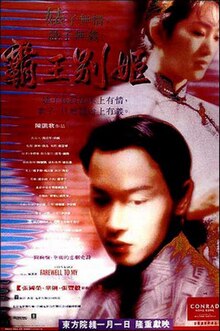| Farewell My Concubine | |||||||
|---|---|---|---|---|---|---|---|
 Theatrical release poster | |||||||
| Chinese name | |||||||
| Traditional Chinese | 霸王別姬 | ||||||
| Simplified Chinese | 霸王别姬 | ||||||
| Literal meaning | The Hegemon-King Bids Farewell to His Concubine | ||||||
| |||||||
| Directed by | Chen Kaige | ||||||
| Screenplay by | Lu Wei Lilian Lee | ||||||
| Based on | Farewell My Concubine by Lilian Lee rewritten from Qiuhaitang (秋海棠) by Qin Shouou (zh:秦瘦鷗) | ||||||
| Produced by | Hsu Feng | ||||||
| Starring | |||||||
| Cinematography | Gu Changwei | ||||||
| Edited by | Pei Xiaonan | ||||||
| Music by | Zhao Jiping | ||||||
Production companies |
| ||||||
| Distributed by | Miramax Films (US) | ||||||
Release dates |
| ||||||
Running time | 171 minutes | ||||||
| Country | China | ||||||
| Language | Mandarin | ||||||
| Budget | $4 million[1] | ||||||
| Box office | Over $30 million (Worldwide)[2] | ||||||
Farewell My Concubine is a 1993 Chinese-Hong Kong epic historical drama film directed by Chen Kaige, starring Leslie Cheung, Gong Li and Zhang Fengyi. Adapted for the screen by Lu Wei, based on the novel by Lilian Lee, the film is set in the politically tumultuous 20th-century China, from the early days of the Republic of China to the aftermath of the Cultural Revolution. It chronicles the troubled relationships amongst two lifelong friends, the Peking opera actors Cheng Dieyi (Cheung) and Duan Xiaolou (Zhang), and Xiaolou's wife Juxian (Gong).
The film's themes include confusion of identity and blurred lines between real life and the stage, portrayed by the revered opera actor Dieyi, whose unrequited love for Xiaolou persists throughout. Commentators also noted themes of political and societal disturbances in 20th-century China, which is typical of the Chinese Fifth Generation cinema.
Farewell My Concubine premiered on 1 January 1993, in Hong Kong. Upon release the film received generally positive reviews from contemporary critics, and jointly won the Palme d'Or at the 1993 Cannes Film Festival,[note 1] becoming the first Chinese-language film to achieve the honour. It won further accolades, including a Golden Globe for Best Foreign Language Film and a BAFTA for Best Film Not in the English Language, and received two nominations at the 66th Academy Awards for Best Cinematography and Best Foreign Language Film.
A few weeks following its China release, the politburo demanded changes to be made to the film due to themes against traditional values and political reasons. While allowing a premiere in Beijing, the government objected to the representation of homosexuality, the suicide of a leading character and a description of the turmoil during the 1960s.[3]
The film was allowed to resume public showings in September 1993, less than a year after its original release. Upon its return the Chinese censors had made numerous cuts, removing 14 minutes. Chinese officials felt that a re-release, as opposed to maintaining a full ban, would silence an ever-growing international backlash and also help their bid to host the Olympic Games in Beijing in 2000.[4][5]
Farewell My Concubine is considered one of the landmark films of the Fifth Generation movement that brought Chinese film directors to world attention.[6][7] In 2005, the film was selected as one of the "100 Best Films in Global History" by Time magazine.
- ^ Elley, Derek (20 May 1993). "Farewell to My Concubine". Variety. Retrieved 8 July 2024.
- ^ The Hollywood Reporter. Wilkerson Daily Corporation. 1994.
- ^ Kristof, Nicholas D. (4 August 1993). "China Bans One of Its Own Films; Cannes Festival Gave It Top Prize". The New York Times. ISSN 0362-4331. Retrieved 2 April 2022.
- ^ "Who Makes the Rules in Chinese Movies?". The New York Times. 16 October 1993. Retrieved 2 December 2019.
- ^ "China bids 'Farewell' to ban". Variety. 3 September 1993. Retrieved 2 December 2019.
- ^ Clark 2005, p. 159.
- ^ Zha 1995, pp. 96–100.
Cite error: There are <ref group=note> tags on this page, but the references will not show without a {{reflist|group=note}} template (see the help page).